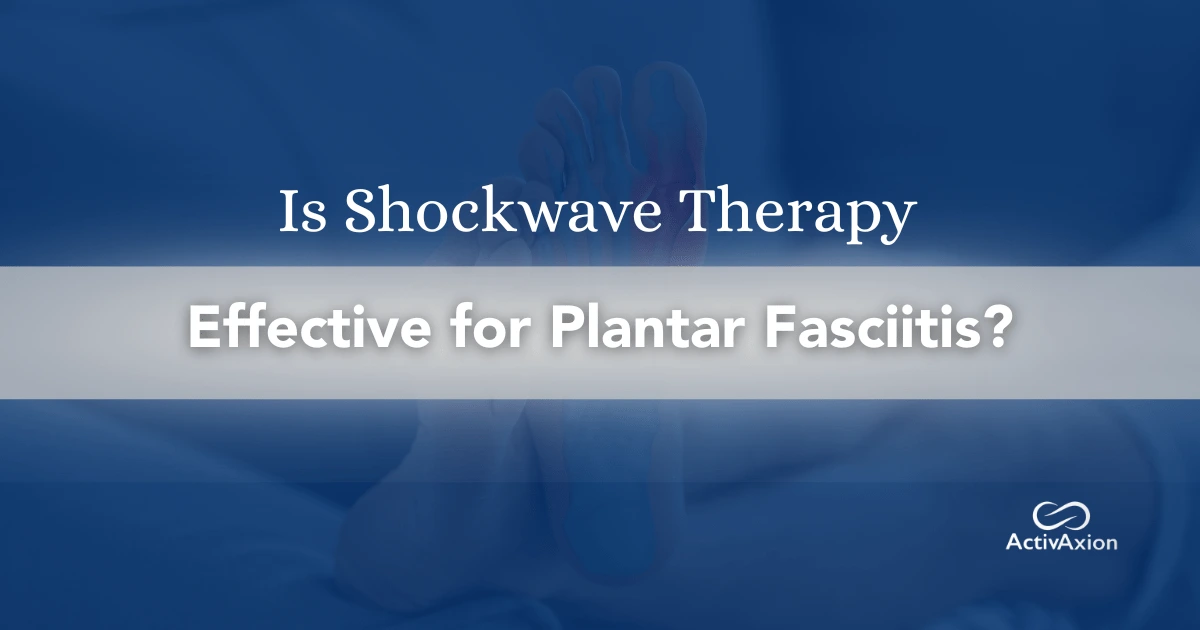Medically Reviewed By Mario Starnino, CATA, CTSQ, ACNN
Plantar fasciitis is one of the most common causes of heel pain, affecting athletes, healthcare workers, and anyone who spends long hours on their feet. As traditional treatments like stretching, orthotics, and medication offer limited results for some, many people are asking: “Is shockwave therapy effective for plantar fasciitis?”
At Activ Axion Montreal, we specialize in advanced shockwave therapy plantar fasciitis solutions that go beyond symptom relief by targeting the root cause of the condition. In this article, we’ll explore the research, benefits, and safety of this innovative therapy.
➡️ Explore Shockwave Therapy in Montreal
What Is Plantar Fasciitis?
Plantar fasciitis is an inflammation of the plantar fascia, a thick band of tissue that connects your heel to your toes. When overstressed, the fascia becomes inflamed, resulting in stabbing pain—especially with the first steps in the morning or after long periods of standing.
Common causes include:
- Overuse or prolonged standing
- Poor footwear or foot biomechanics
- Weight gain or obesity
- Tight calf muscles
When traditional treatments aren’t enough, patients begin to consider alternatives like shockwave therapy plantar fasciitis treatments.
🦶 Get professional treatment for heel pain at Activ Axion
What Is Shockwave Therapy and How Does It Work?
Shockwave therapy—also known as extracorporeal shockwave therapy (ESWT)—delivers acoustic pulses to damaged tissue. These waves increase blood circulation, break down scar tissue, and stimulate natural healing processes.
For shockwave plantar fasciitis treatment, the therapy is targeted directly at the inflamed fascia, promoting regeneration of damaged fibers.
“Extracorporeal shock wave therapy significantly reduces heel pain and improves function in patients with chronic plantar fasciitis.”
— Source: https://pubmed.ncbi.nlm.nih.gov/15502590/
🎯 Start your recovery with Activ Axion’s shockwave treatments
Is Shockwave Therapy Effective for Plantar Fasciitis?
Yes—multiple clinical studies confirm the effectiveness of shockwave therapy plantar fasciitis treatments, especially for chronic cases that don’t respond to conservative care.
“Shock wave therapy led to a significant reduction in pain and improvement in function in patients with recalcitrant plantar fasciitis.”
— Source: https://www.ncbi.nlm.nih.gov/pmc/articles/PMC2657493/
Key Benefits Include:
✅ Non-invasive
✅ No anesthesia required
✅ Promotes tissue repair
✅ Reduces chronic heel pain
If you’re wondering “Is shockwave therapy effective for plantar fasciitis?” the science and patient outcomes say yes—especially when performed at specialized clinics like Activ Axion Montreal.
Is Shockwave Treatment Safe for Plantar Fasciitis?
Yes, shockwave treatment is safe for plantar fasciitis when administered by qualified professionals. It is Health Canada-approved and widely used in sports medicine, orthopedics, and rehabilitation clinics.
Minor side effects like redness, swelling, or slight discomfort may occur but typically resolve within 24–48 hours.
At Activ Axion Montreal, we follow evidence-based protocols tailored to your condition, ensuring both safety and efficacy.
🔒 Book a safe, effective treatment session with us
What to Expect During Your Shockwave Treatment
Each shockwave therapy plantar fasciitis session takes about 15–20 minutes and includes:
- Initial Assessment – Your pain level and foot biomechanics are evaluated.
- Targeted Treatment – Acoustic waves are applied to the heel and fascia area.
- Post-Treatment Advice – You may resume most normal activities immediately.
Most patients experience plantar fasciitis improvement within 3–5 sessions spaced a week apart.
Ideal Candidates for Shockwave Plantar Fasciitis Therapy
You may benefit from shockwave therapy if you:
- Have had plantar fasciitis for 6+ weeks
- Tried rest, orthotics, or medication without success
- Want to avoid cortisone injections or surgery
- Have recurring pain with standing or walking
📍 See if you’re a candidate at Activ Axion Montreal
Suffering From Heel Pain?
Try Shockwave Therapy for Plantar Fasciitis at Activ Axion!
✅ Non-Surgical | ✅ Effective | ✅ Montreal-Based Clinic
📞 Call 438-601-2277 or
👉 Book Your Appointment Online
FAQs
How to treat plantar fasciitis with shockwave?
To treat plantar fasciitis with shockwave therapy, a trained specialist uses a handheld device to deliver sound waves to the heel area. This promotes blood flow, breaks down calcified tissue, and reduces inflammation. Treatments at Activ Axion Montreal are tailored to your condition, with 3–5 sessions providing long-term relief. Book your treatment
Shockwave settings for plantar fasciitis?
Typical shockwave therapy plantar fasciitis settings include low to moderate energy levels (0.08 to 0.28 mJ/mm²), with around 2,000–3,000 pulses per session. Frequency and intensity are adjusted based on your pain level and healing response. Activ Axion customizes your settings for optimal comfort and results. Schedule your session
What if plantar fasciitis doesn’t go away even after shockwave?
If your plantar fasciitis doesn’t resolve after shockwave therapy, further evaluation may be needed. Factors such as incorrect footwear, underlying foot mechanics, or nerve involvement could be contributing. At Activ Axion, we combine shockwave therapy with biomechanical assessments and physical therapy for better outcomes. Get expert help here
Can shockwave therapy make plantar fasciitis worse?
While rare, mild discomfort may occur after treatment due to the stimulation of healing processes. However, shockwave therapy for plantar fasciitis is designed to promote recovery, not cause harm. Activ Axion ensures precise targeting and proper protocols to minimize any risks.
Who has extracorporeal shockwave therapy best for plantar fasciitis?
Extracorporeal shockwave therapy is best suited for patients with chronic plantar fasciitis unresponsive to conservative treatment. Athletes, runners, and people with long-standing heel pain often benefit the most. At Activ Axion Montreal, we specialize in advanced pain relief using targeted ESWT protocols.

